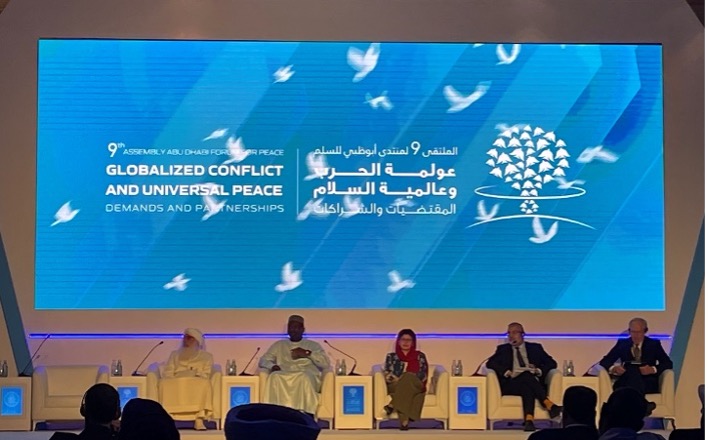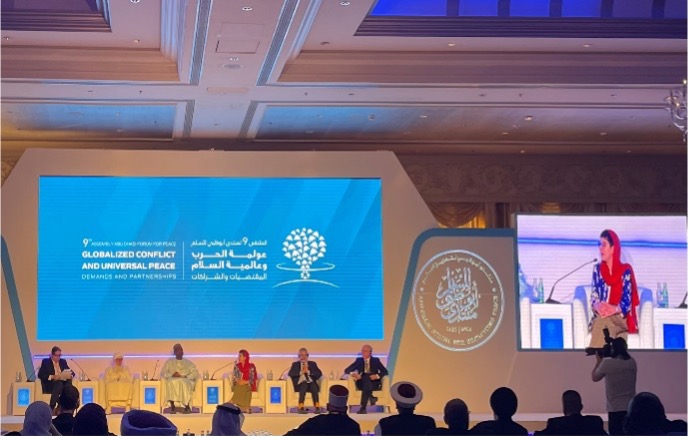Abu Dhabi 9th Peace Forum – Religious Leaders in Promoting Global Peace – Secretary General of Religions for Peace’s Speech on 8 November
“Peace happens when we – no matter what our religion – listen to one another, hear what is being said, and actually work together”
On 8 November, Prof. Azza Karam, Secretary-General of Religions for Peace International, delivered a keynote lecture on “The Role of Religious Leaders in Promoting Global Peace,” in the context of the Ninth Assembly of the Abu Dhabi Forum for Peace, held under the theme, “Global Conflict and Universal Peace: Urgent Needs and Opportunities for Partnership.”

Speaking to the importance of maintaining and fostering religion as the “common language of humanity,” Prof. Karam stressed the clear distinction between peace and mere conversations on peace. Peace is not the product of various and sometimes concurrent high level and expensive conferences about peace across the globe, she stated, but rather the result of partnerships between and across all faiths and sectors, especially those of religious institutions and faith communities. For centuries, religious institutions and faith communities have continuously mobilised efforts to respond to the world’s most pressing crises across the globe. What is direly lacking and urgently needed, however, is multi-religious collaboration, which is at the heart of the Religions for Peace movement.
Since its inception in 1970, Prof. Karam recalled, Religions for Peace has realised an alliance of religious institutions and faith traditions, similar to the United Nations. But instead of uniting governments, this alliance complements governmental efforts, bringing religious leaders together, to advance the common good – i.e. peace writ large.
Building on the organisation’s knowledge as the largest multireligious leadership platform with over 90 national and regional Interreligious Councils for the past 52 years, Prof. Karam shared some critical lessons learned from its efforts to convene religious leaders to promote global peace collaboratively, rather than doing so independently.

First, the concept of religious leadership has to be reimagined and reconstructed. Efforts to advance peace are not solely developed and executed by religious leaders, who are critical as thought leaders and community actors, but we need to understand that ‘religious leaders” are also those heavily engaged in serving their communities, including through multi-faith work. This broader definition, she argued, ensures that religious leaders and their institutions expand their sphere of influence and human resources at their disposal, while also ensuring that those who serve the common good with faithful deliberation and intent, are able to be recognised for their efforts. Together, these diverse leaders can expand reach and impact. “If we point fingers at those doing harm in the name of one religion against others,” she stressed, “we should be able to give credit to those working together across all differences to serve all.”
Second, religious leaders of all faiths and types, need to avoid the mistakes of political leaders. Politicians are guided by select interests of some, whereas religious leaders must be guided by the common good to all. Multi-religious collaboration and efforts, in turn, should not be guided by narrow political interests, but rather by the common interest of all religions – that is, peaceful coexistence between peoples and planet.
Third, it is proven, time and again, that when religious leaders and institutions work together, there is no room, conceptually or practically, for extremist or fundamentalist thoughts or impulses. In fact, working together across all faiths secures common action for the common good – everyone’s good, and the good of all life, including that of our planet. Working together is the only way to eradicate extremism and other prejudiced notions towards each and all faith traditions.
Lastly, Professor Karam pointed to her ears as she said, the only way we can succeed in securing peace is when and if we “not just talk at one another, but actually listen to each other. It is by listening to one another that our own faiths are strengthened, because we can then hear God.”
*Prof. Azza Karam delivered her keynote lecture in Arabic.